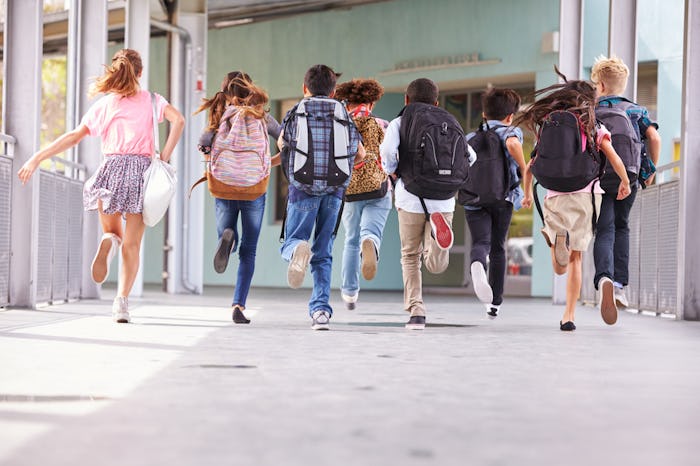Amid an increasing number of violent incidents and shootings in schools, there is a nationwide debate about the best way to keep students safe. While some, including President Trump, have argued that the best option is to introduce more armed police into schools, schools need additional mental health professionals, according to an ACLU report, to help tend to kids' needs. Without enough of this type of support, the organization fears schools and students are vulnerable, according to reporting from CNN.
Per the ACLU's report, titled "Cops and No Counselors: How the Lack of School Mental Health Staff is Harming Students," almost one-third of public school students attend schools that have police officers on hand, but do not have counselors, nurses, psychologists, or social workers. According to CNN, this is a direct result of schools rethinking security measures to ensure that they're better prepared for emergencies, as well as an increased amount of funding on local, state, and federal levels for campus officers. The ACLU report states, however, that a "severe shortage of the staff most critical to school safety and positive climate" makes schools far more likely to have such incidents. Harold Jordan, a senior policy advocate for ACLU-PA told The Philadelphia Tribune, a shift is necessary, otherwise "you're just going to end up with more kids who are connected to the juvenile justice system."
"We point out that there's a lack of support services to students in the form of adults who are professionals who know how to work with young people with whatever issues they may be experiencing," Jordan said, according to the newspaper. "I think having more sensitive, well-trained adult professionals in schools is a win, no matter what your definition of school safety is."
It's not just the ACLU that believes access to counselors, and other mental health officials, is imperative to student's success in school. The American School Counselor Association recommended in a statement on its site one counselor for every 250 students. Despite this, the ACLU report found that only Montana, Vermont, and New Hampshire meet or come close to that ratio. LimaOhio.com reported that the average student-to-counselor ratio in New Hampshire was 237 to one, while in Montana it was 207 to one. The site did not report on Vermont's numbers. On average, the ACLU said in its report, schools have one counselor for every 444 students.
To make matters worse, the ACLU found that less than three percent of schools met the professional recommendation for social workers, 43 percent of public school students went to schools that didn't have a psychologist on hand, and a third of students went to a school with no nurse, while 43 percent of students reported attending a school with a security guard or other such figure, per CNN. That breaks down to 1.7 million students in schools with some form of security but no counselor and 14 million who go schools where there is police but no counselor, nurse, social worker, or psychologist, according to the ACLU report.
"It's physically impossible for them to have an impact on students with developmental needs," Eric Sparks, the assistant director of the American School Counselor Association, said, according to CNN. "We have many schools where students don't have access to a school counselor and some schools don't have a school counselor."
With a strong presence of law enforcement-types, and none or too few mental health staffers, the ACLU argues that schools are not well equipped to address the social, emotional, and behavioral needs of students. Instead, the organization said in its report, schools are more likely to criminalize "typical adolescent behavior," which impacts students of color and kids with disabilities at higher rates.
"Having law enforcement on campus is a key contributor to this school-to-prison pipeline," the ACLU said. "The likelihood of a student dropping out of school increases significantly every time they touch the criminal justice system."
Information for the ACLU's report was gathered from 2015-2016 data collected by the Department of Education's Office of Civil Rights. The organization used it to compare access to school-based mental health services to access to police officers and security guards in more than 90,000 schools. The ACLU found that "millions of students are being underserved and lack access to critical supports."
"These glaring deficits in mental health staff for students are inexcusable, especially in comparison to the number of reported law enforcement in schools," the ACLU report said.
Mo Canady, the executive director of the National Association of School Resource Officers — which supports armed officers in schools, according to a statement on its website — disagreed with some of the findings in the ACLU report. Canady said, according to CNN, that it was unfair to combine resource officers (SROs), whom he noted often engage with students in a positive way, with other law enforcement officers. Canady added in his statement, "It doesn't need to be one or the other."
The ACLU, as well as many parents, are calling for more funding on all levels for counselors and other mental health support staff in schools. Supporters feel, as the organization expressed in its report, that it's the best way to curb issues plaguing young people in America, like increased arrests, school drop outs, addiction, and more. Safety in schools is the ultimate goal, government officials must examine the root of the problem: Mental health. Anything less is a failure to our kids.
